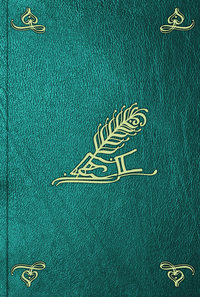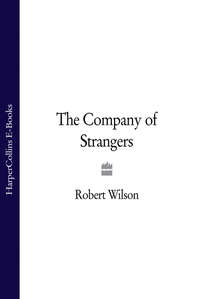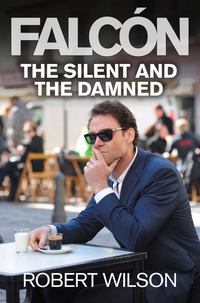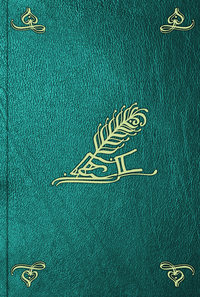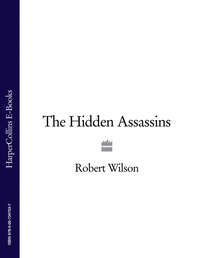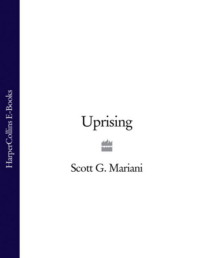
Полная версия
Instruments of Darkness

Instruments of Darkness
Robert Wilson

For Jane and in memory of my father
1922–1980
Table of Contents
Cover Page
Title Page
Dedication
AUTHOR’S NOTE
Map
Prologue
Chapter 1
Chapter 2
Chapter 3
Chapter 4
Chapter 5
Chapter 6
Chapter 7
Chapter 8
Chapter 9
Chapter 10
Chapter 11
Chapter 12
Chapter 13
Chapter 14
Chapter 15
Chapter 16
Chapter 17
Chapter 18
Chapter 19
Chapter 20
Chapter 21
Chapter 22
Chapter 23
Chapter 24
Chapter 25
Chapter 26
Chapter 27
Chapter 28
Chapter 29
Chapter 30
Chapter 31
Chapter 32
Chapter 33
Chapter 34
Robert Wilson
Praise for Robert Wilson
By the Same Author
Copyright
About the Publisher
AUTHOR’S NOTE
The French West African currency, the CFA, was devalued in January 1994 from 50 CFA to 100 CFA to the French franc. All financial transactions in this novel are based on the old rate.
Although this novel is set very specifically in West Africa, and its backdrop is the Liberian Civil War, all the characters and events in it are entirely fictitious and no resemblance is intended to any event or to any real person, either living or dead.
Map
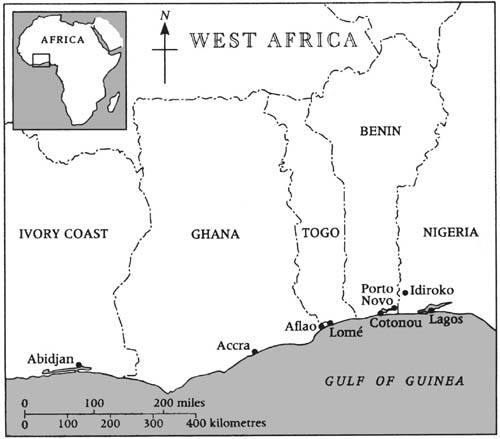
Prologue
My name is Bruce Medway. I live in Cotonou, Benin, West Africa, along that stretch of coast they used to call the White Man’s Grave because it was hot, humid, and full of malaria. It still is, but we don’t die so easily now. Air conditioning and quinine have made us smell better and more difficult to wipe out.
I travelled across the Sahara a couple of years ago and stayed. I knew I wasn’t going back before I came. I used to live in London where I made good money in a shipping company. The boredom crushed me, the traffic nearly killed me and the recession threw me out of a job.
Now I live in this warm, damp hole in the armpit of Africa and it suits me. The house is rented. I share it with Moses, my driver, who occupies the ground floor and Helen, my cook and maid, who lives with her sister nearby and comes in every day.
I don’t make much money. I’d make more without Moses and Helen, but then, cooking and driving in 100 degrees isn’t much fun, they need the money, and I like them.
I’ve got some work. I collect money for people, some of which is late, more of which is very late and most of which is so late it’s stolen. I organize things for people – offices, transport, labour and contacts. I negotiate. I manage. Occasionally I find people who’ve lost themselves, some of them accidentally, others on purpose. I’ll work for anybody unless I know they’re criminal or if they ask me to follow their wives or husbands. My clients are mostly expatriates. A lot of them I wouldn’t invite back to my mother’s, and that’s probably why they’re here and not there.
They come here to trade as they have done for the last 500 years. They’re a different crowd now – Lebanese and Armenians, Chinese and Koreans, Syrians and Egyptians, Americans and Asians. The Europeans are still here as well, toughing it out with the soggy climate. A lot of them drink too much, some because there’s nothing else to do and others because they want to forget why they’re here.
They trade with the Africans and the Africans trade with each other and they all move up and down the coast with the same aim – a fast, hard buck. In Ghana and Nigeria, the old British colonies, the bucks aren’t hard and fast. Their currencies, the cedi and the niara, flop about with the price of cocoa and oil. In Togo, Benin and Ivory Coast the French keep a foot in the door of their ex-colonies by supporting the CFA franc (Communauté Financière Africaine) at fifty to the French franc so that’s the hard, fast buck that everybody’s after. When they get it, they want more. It’s no different to anywhere else in the world.
Chapter 1
Tuesday 24th September
There were a few worse places to be in the world than outside warehouse 2 in Cotonou Port, but I couldn’t think of them. Moses and I were on our haunches in 105 degrees and – it felt like – 200 per cent humidity. I was losing weight and patience.
Berthed on number 2 quay, in air crinkled by the heat from the baked concrete, was the Naoki Maru. It was a 14,000-tonner dry cargo ship with a rust problem and an Oriental crew who leaned on their elbows at the ship’s rail, waiting. Waiting to discharge my client’s 7000 tons of parboiled rice from Thailand which was going to be sold to Madame Severnou, who I was waiting for to come and give me the money. Above us, on the roof, a couple of vultures were waiting for someone to make a mistake crossing the road. A driverless fork lift stood outside warehouse 3 with a pallet of cashew nut sacks a metre off the ground waiting to put them down. I could see the driver, waiting and doing some sleeping on some sheanut sacks in the warehouse. We were all waiting. This is Africa where everybody has mastered the art of waiting. Waiting and sweating.
The sweat was tickling my scalp as it dripped down the back of my head. I could feel it coursing down my neck, weaving through my chest hair, dribbling down my thickening stomach and soaking into the waistband of my khaki trousers so I knew I’d have a rash there for a week. I wasn’t even moving. The dark patches under my arms were moving more than I was. I looked down at my hands. The sweat hung in beads off my forearms and dripped down my knuckles and in between my fingers. Christ, even my nails were sweating. I looked at Moses. He wasn’t sweating at all. His black skin shone like a pair of good shoes.
‘Why you no sweat, Moses?’
‘I no with a woman, Mister Bruce.’
‘You do sweat then?’
‘Oh yes please, sir.’
I had a newspaper in my hand called the Benin Soir which always came out the morning after the ‘soir’ looking unshaved, hungover and ready for nothing. I opened it and scanned the pages. There was nothing but smudged newsprint and black and white photographs of African people on black backgrounds. I tried to get some breeze from turning the pages.
I turned the last page and folded the paper in half. I was going to start fanning my face, which is what most people use the Benin Soir for, when I saw an almost readable item in the bottom left-hand corner with the heading: Tourist Dead. Cotonou had never had tourists and now the first one had died.
The article told me that a girl called Françoise Perec, a French textile designer, had been found dead in an apartment in Cotonou. There was a paragraph that finished with the word sexuel which I couldn’t read at all and I didn’t need to. A police spokesman said that it looked like a sex session that had gone too far. I wondered how a policeman could tell that from a dead body. Is there such a thing as an ecstatic rictus? A drop of my sweat hit the page. I folded the newspaper and used the Benin Soir how it was meant to be used.
I was beginning to gag on the smell of hot sacks, stored grain and crushed sheanut when a pye-dog strayed out of the warehouse shade. It wasn’t the healthiest pye-dog I’d ever seen. It definitely wasn’t anybody’s pet dog. It had the shakes. I could count its toast rack ribs and it needed a rug job. Its nose hoovered the ground. Out of the corner of my eye I saw one of the crewmen leave the ship’s rail. The pye-dog moved in tangents. It stopped, clocked round a spot as if its nose was glued to it and then moved on. The crewman bounced down the gangway. There was a flash of light from his hand. He was carrying a cleaver.
Moses had pushed up his sunglasses and was frowning at the way things were developing. Inevitability was in the air. The pye-dog, its diseased hindquarters shaking, the crewman, his stainless steel cleaver glinting, closed on each other. The sun was high. There were no shadows. The instant before they met, the dog looked up, aware of something. The survival instinct wasn’t operating too well inside that pye-dog. He looked right. The crewman came from the left and took the dog’s head clean off with a single blow.
There was no sound. The dog’s fallen body twitched with brainless nerves. The crewman picked up the dog’s head and held it trophy high. The men at the rail burst into cheering and clapping. Moses threw off his Mr Kool act and was up on his feet, eyes rolling in horror, and pointing.
‘Must have been a Chinese,’ I said, before Moses could get anything out.
‘Why he kill the dog?’ asked Moses.
‘To eat.’
‘He eat him?’ Moses was shocked.
‘You eat rat. He eat dog,’ I said, trying to balance the horror of foreign cuisine.
‘Dog eat dog,’ said Moses, laughing at his own joke, ‘…and I no eat rat. I eat bush rat and he no rat rat.’
‘I see,’ I said, nodding.
The crewman put the dog’s head down and picked up the body which he tucked under his arm. The legs still twitched in memory of birds chased and rubbish investigated. He bent down again and picked up the head by an ear. He walked back to the ship. The dog’s tongue lolled out of the side of its mouth. Its wall eyes bulged out. A dark patch remained on the concrete of number 2 quay.
‘He go eat him!’ Moses confirmed to himself as if it were a fair thing to do.
‘Hot dog,’ I said without smiling, knowing that Moses would roar with laughter, which he did. My best lines fall on deaf ears, my worst are a triumph. I think I satisfy his anticipation.
‘Here we go,’ I said, standing up.
Moses turned and saw the group of hadjis heading our way. Al hadji is the title given to a Muslim who has been to Mecca. Before air travel it must have been a big deal to have been a West African hadji. Now they charter planes and a grand will do the job. These boys have got money and Allah on their side and a long line in horseshit.
They looked quite something, for a bunch of businessmen, dressed in their floor-length robes, their black skins against the light blue, green, burgundy and yellow cloth, their heads bobbing underneath multicoloured cylindrical hats. In another world they could have been showing a summer collection. Here they meant business. They were going to hassle me for the rice which wasn’t mine to be hassled for. I reached for my cigarettes. They weren’t there. I gave up last year. That’s why I put on the weight. It all came back.
I heard an expensive engine. A grey Mercedes with tinted windows stopped with a squeak in between me and the hadjis. An electric motor lowered the window. The hadjis huddled together so that the car’s occupant must have seen seven sweaty faces pressed into the frame of the window. One of them took out a hanky and wiped his brow.
Some African words came from the back seat of the car. The words sounded like they could move some sheep around. They had the hadjis rearing back. The group moved as one, turning and walking back to the port entrance. The window buzzed back up. One of the hadjis fell back to get a stone out of his Gucci loafers.
The Mercedes swung round to where Moses and I were standing. The driver, anthracite black, was out of the car almost before it had stopped. He opened the rear door and looked as if he might drop to one knee.
I got a short blast of air-conditioned cool and with it came Madame Severnou. All five foot of her and another nine inches of sculpted deep green satin which sat on her head but could just as easily have made it to a plinth in the Uffizi. At six foot four I could put a crick in her neck, but as Madame Severnou knew, size wasn’t anything.
‘Bruce Medway,’ she said, as if tungsten would melt in her mouth. She held out a small coffee-coloured hand encrusted with gold rings and jewels.
‘Madame Severnou,’ I said, taking her hand and thinking, this is one of the few occasions you put twenty grand into someone’s hand and get it back. ‘How’s business?’
‘Very good. I’ve been in Abidjan…Ali!’ she shouted, withdrawing her hand and checking it to make sure she hadn’t slipped a grand or two.
The driver, who had been standing to attention by the boot, opened it on cue. He took out the double bedsheet which had been drawn into a sack like laundry. Moses opened the boot of my smacked-up Peugeot estate and Ali dumped it on top of the tool box and spare tyre.
‘What did you say to the hadjis?’ I asked Madame Severnou.
‘I remind them I am the seller. They know it but they forget sometime.’
Madame Severnou was petite from the waist upwards but downwards was the market mamma bottom, a bargaining tool not to be messed with. This meant that she didn’t walk, she waddled, and the bottom did what the hell it liked. She waddled over to the Peugeot. Moses backed off. She turned to me and said: ‘Six hundred and thirty-six million CFA. I hope you have some friends to help you count it. Not much of it is in ten thousand notes.’
She held out her hand and I put an envelope in it which she tore open. Her eyes flickered for a fraction of a second.
‘This is a non-negotiable copy,’ she said with an edge to her voice that I could feel against my carotid.
‘It is,’ I said.
‘It’s no Monopoly money in here!’ she said, pointing at the boot. ‘Ali!’ she roared, whipping the air with her finger. Ali lunged at the laundry.
‘Moses,’ I said in a voice made to steady the thin red line. The boot came down and Ali was lucky to get away with his fingers still on.
‘I’ll count it and give you the original tomorrow,’ I said to Madame Severnou. The ground frosted over between us but we both started at the two vultures which dropped down beside the dark patch where the pye-dog had been killed and broke Madame Severnou’s concentration. She turned back to me.
‘I give you six hundred and thirty-six million CFA and you give me a piece of paper.’ Her voice came fully loaded. I said nothing. The look she gave me thudded between my eyes and I realized this was not the usual West African drama.
The two vultures, their wings folded behind their backs, paced around the patch on the quay like two detectives inspecting the outline of a murder victim.
‘What about demurrage?’ asked Madame Severnou.
‘Time doesn’t start counting until tomorrow noon.’
‘What about my trucks?’
‘I’ll see you tomorrow. I’ve only got twenty-four hours to count all this.’
Something clicked in Madame Severnou’s face. The points had changed. The boiling anger flattened to a simmer, her little mouth pouted and broke into a smile.
‘OK. You come to lunch. I cook for you. Agouti. Your favourite.’ Her smile was like a faceful of acid.
I got the panoramic view of her bottom as she climbed into her car. Ali closed the door. The window buzzed down. She had all the techniques and the technology to go with them.
‘I do the snails for you as well. Just like last time.’
The window slid back up and the Mercedes moved out into the fierce sunlight between the warehouses. Agouti? That’s bush rat which she cooked with okra and manioc leaves. ‘Rat in Green Slime’. The snails, my God, the snails – they looked and tasted like deformed squash balls and the chilli sauce was so hot the last time, I woke up the next day still in a silent scream.
Moses hadn’t missed the cruelty in those eyes as the electric window zipped up her face. He was fumbling for the door handle. I was nervous myself.
‘Less go now, Mister Bruce.’
‘Wait small.’
‘Is lunchtime.’
‘I know. I think is better we wait small. Let the traffic calm down. Then we go. We look at this ship now.’
We drove to the ship circling the vultures on the way. They were shaking their heads, then looking at each other, then staring at the ground. They knew there had been a death, a recent one, and a pye-dog too, but where the hell was it?
This was a first for Moses and I to be driving around with more than a million pounds in the back seat and Moses’s clutchless gear changes were shredding metal and my inner calm. Madame Severnou hadn’t made things any easier for us. At least she didn’t know where I lived and I was anxious that she didn’t find out. I had a feeling from the sweetness of her lunch invitation that well before we sat down to eat I was going to get a lesson in business etiquette that wasn’t included in the Harvard course.
One of the crewmen took me up to meet the ship’s Korean captain in his cabin. The generator rumbled like an old man in a bathroom but still coughed out some air conditioning which made my back colder than a dungeon wall. The captain poured me a cold beer. The first inch put medals on my chest. There was a photograph on the cabin wall of the captain with what looked like his local kindergarten.
‘Which ones are yours?’ I asked.
‘All of them,’ he said.
‘All of them?’
‘And another coming. I love childrens.’ He said it like most people talk about pizza.
We chatted about rice, his home in Korea, storms in the Pacific and favourite ports. He wasn’t an African fan. On the way here he had discharged containers in Abidjan and Tema, picked up some containers of old cashew nut in Lomé, and was now going to Lagos to discharge hi-fi and load cotton, then on to Douala or Libreville, he didn’t know which, and it didn’t matter because he hated both. He liked Ghana. They had a good Korean restaurant in Accra. I knew it. They served me a gin and tonic there which came with a stretcher.
He walked me around the ship. I felt like royalty except I couldn’t think of anything nice to say. It was one of those ships that takes a bunch of Koreans two weeks to build. Five holds, one aft, four forward with the bridge in between. The lifting gear on number 5 hold at the rear of the ship was broken; the captain put his hand on my shoulder and told me not to worry, that the rice was in the four forward holds. The fifth hold had the hi-fi in it for discharge at Lagos, and that was where they would fix the lifting gear.
We looked at the rice, which wasn’t very interesting. How long can you look at a pile of sacks? The captain said something to a man holding a four-foot spanner who would never be clean again. I thought about showing some interest, but instead leaned on the slatted metal cover of number 2 hold and earned a first degree burn for my trouble. Moses stood by the gangway, not learning any Korean at all. It was time to blow. The smell of hot painted metal was taxing my nose’s interest in life.
I held my hand out to the captain who said: ‘You must have lunch,’ and we both turned at the same time because Moses was showing us how to get down a gangway starting on his feet and ending on his nose.
‘Moses!’ I shouted.
He was holding the car door open for me which he had done on the first day he worked for me and never since.
‘Yes please, Mister Bruce, sir.’
‘Lunch?’
‘You forget something, Mister Bruce.’
‘No.’
‘You have meeting.’
‘I have?’
‘The meeting with the man with the dog.’
‘The man with the dog?’
‘Yes please, sir.’
I turned to the captain and shook his hand. ‘Sorry, I have a meeting with a man with a dog. Next time, I hope.’
As I got in the car, I saw Moses was sweating.
‘I don’t see no woman, Moses,’ I said down my shirt front.
We drove off, me grinning and Moses shouting: ‘You go make me eat dog! Mister Bruce. I no eat um. I no eat um never.’
Chapter 2
The port was at a standstill; only the sun was out working on the scattered machinery and the corrugated iron roofs which creaked and pinged in the terrible heat. The shade of the buildings guarded sprawled stevedores who, rather than slow broil on the hot ground, lay across wooden pallets sleeping. The Peugeot’s tyres peeled themselves off the hot tarmac.
There was no traffic outside the port. We looked left down the Boulevard de la Marina and fifty metres down the road a parked car’s engine started. We turned right and headed east into Cotonou town centre. Moses’s eyes flickered from the windscreen to the rearview.
The sun leeched all the colour out of the sky, the buildings, the people, the palms, the shrubs, everything. Through the open window a breeze like dog breath lingered over my face as I manipulated the wing mirror. A madman with dusty matted hair stood in dirty brown shorts inspecting his navel. He slumped to his haunches as we drove past and started parting the dirt on the road as if something had fallen out. We passed the agents’ offices. The air conditioners shuddered and dripped distilled sweat into the thick afternoon air.
‘He following us, Mister Bruce.’
‘Slow down,’ I said. ‘Turn left.’
Moses dropped down to a fast walking pace and the car, an old Peugeot 305, settled behind us. Vasili, a Russian friend of mine, had told me not to worry about learning about Africa, that the Africans would teach you all you needed to know. They weren’t going to teach me anything about tailing cars.
‘Left again,’ I murmured. ‘And again.’
We were back to Boulevard de la Marina, still with our tail. Three cars slicked past in front of us heading into town.
‘Take them,’ I said, and Moses’s foot hit the floor.
We were past one car when a truck pulled out from the left, past two by the time its driver saw us. Moses didn’t bother with the third car, which would have put us through the radiator grille of the truck, but with his mouth wide open preparing to scream, he swung between the second and third cars and went up on to the pavement where he took out two frazzled saplings, snappety-snap, and overtook the third car on the inside, crashing back on to the road just in time for the roundabout which he took more briskly than he intended.
Behind us, the truck had slewed and stopped across the road, the second car was now facing the other way and the tail was up on the pavement with the car’s cheekbone crumpled into a low concrete wall. Cyclists sizzled past giving the scene the eyes right.
‘We lose him?’ asked Moses.
‘You lost him,’ I said, straightening my eyebrows.
We came into the centre of town, which, far from being free of lunchtime traffic, was jammed with cars moving at the pace of setting lava with half a million bicycles swooping in and out of them like housemartins. In the mid-seventies the President had announced a Marxist-Leninist revolution and forged links with the People’s Republic of China who built a football stadium and then took the opportunity to sell the Beninois a lot of bicycles. All that remained of the old regime were some battered hoardings with Marxist slogans like La lutte continue, which had now become the white man’s battlecry as he tried to make money in a difficult world.


